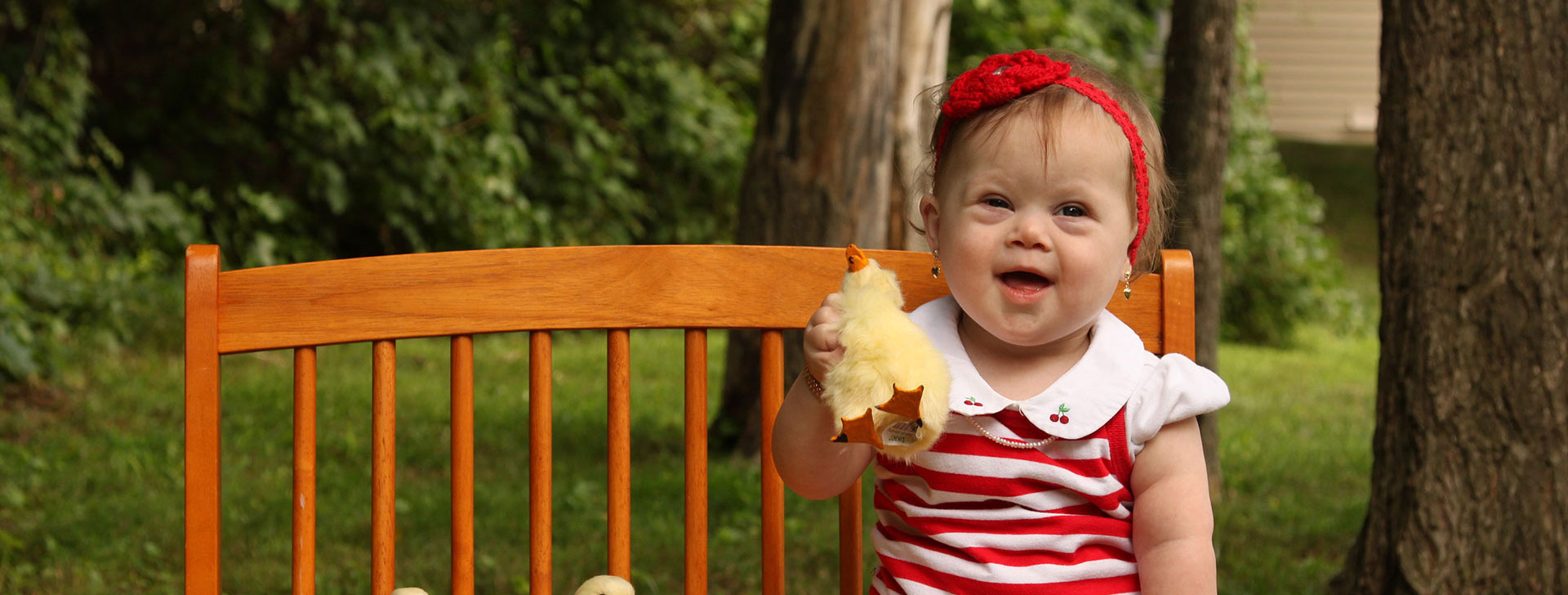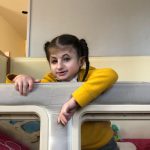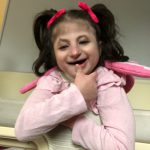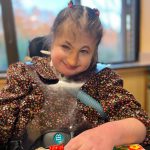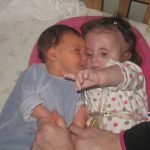Our Family Experience with Trisomy 18
Rosie Just
Blimie was born on January 27, 2009 at 42 weeks, after a very tense pregnancy. It was at 8-9 weeks’ gestation that I first found out that something was very wrong. My ob/gyn detected something on the ultrasound that he didn’t like and arranged for a more accurate ultrasound the next day. When I asked him what he was seeing he mumbled something I didn’t understand. But I find it hard to deal with the unknown so I asked him to write down the medical term on a piece of paper. Then I asked him what would be done if the finding was confirmed. He glanced at me uneasily, hesitated and then said, “Well, most people abort”. My heart dropped. I don’t know how I got there but I remember standing at the top of the subway stairs, pacing back and forth and crying to my husband over the phone.
Once home I realized I was still clutching the piece of paper the doctor had given me. I opened it and saw the words ‘cystic hygroma’. The next day it was confirmed that there was indeed a cystic hygroma, which is extra fluid along the back of the neck and spine of the fetus. Some research informed me that it is associated with 4 conditions, all of which are chromosomal abnormalities, but not hereditary.
Two of those, Trisomy 13 and Trisomy 18, were at that time considered ‘incompatible with life’. Once again, my stomach dropped.
And so began a journey of highs and lows, anxiety, tears, exhaustion, and sometimes hysterical laughter. But first we had a decision to make. The ob/gyn recommended a CVS to confirm the diagnosis and pinpoint what we were dealing with. The next day my husband called the heilige Skulene Rebbe (Zt’l) and was told, “no CVS, no abortion”. I knew I would do exactly as the Rebbe instructed.
Since the doctors had no diagnosis they were forced to treat this pregnancy as one in which there was a possibility of life, not one that was incompatible with life. It quickly became apparent that the baby had heart issues and so I was sent for ultrasound after ultrasound and fetal echo after fetal echo. After every appointment and every new doomsday finding, I came home drained and teary. After a few days I would find my footing only to go to the next appointment and start all over again.
One morning I was waiting for a school bus, feeling like I was in a different universe. Although I tried to hide the pregnancy, eventually that became impossible. There are no words to describe putting on maternity clothes, knowing your baby would probably die any day. That morning two of my neighbors came over to congratulate me on my pregnancy and I just looked at them and blurted out, “My baby is probably going to die any day”.
One of the worst moments I remember is coming home from a very tough appointment and my baby was kicking, kicking, kicking so vigorously. I remember thinking, if this baby is so sick how is it kicking so hard? Then I remember crying and talking to my baby and saying, ‘why don’t you just stop kicking and die already?’
Someone I spoke to told me to try and focus on simcha during this tough time and I thought to myself, simcha? I had to work really hard to get out of bed each morning, help my children get ready for cheder and school, keep the house functioning and make supper, do laundry and greet them without crying when they came home. How was I going to find simcha? But I tried extremely hard. One Friday night we were playing Rummy. I was really tired, and after several rounds I was looking for a way out. So, I took my Rummy pieces and began laying them out in a totally random way; my kids were watching closely, sure I was doing something brilliant, and then I stopped as if I had won. That was one time we laughed hysterically. I know there were others and it definitely functioned as a kind of release for all of us.
At 42 weeks I gave birth on a Tuesday morning and finally found out that the baby was a girl. There was a whole team of doctors waiting for her; her Apgar score was very decent and she weighed 5 pounds 9 ounces, which is huge for a baby with her diagnosis. My husband tried to tell me there was nothing wrong with her, but I knew she was very sick. We needed DNA testing to get a diagnosis but from the hospital staff there was radio silence; nobody came to tell me how she was doing, when they were going to do the testing, when they expected results, nothing. Finally, my brother called a medical askan who called me for the story and then proceeded to blast me for going ahead with the pregnancy. That was a bonus for a postpartum woman.
The entire time my daughter was in the hospital I was treated like a deluded Chassidic woman who thought she could mumble a few words and cure her very sick child. Never mind that I had done a ton of research on her condition and was very aware of the implications. At one point, they assembled a team of doctors in the conference room and called upon a Jewish doctor to be their spokesperson. “Your baby is going to die,” he said. It was on the tip of my tongue to say, ‘so will you, and you don’t know when either’, but how could I say that to a Yid… so I kept quiet while trying not to cry. We were asked about a DNR (Do Not Resuscitate) but we had been advised not to sign one. Some doctors and nurses take that as a license not to provide any care such as oxygen and sometimes nutrition. Therefore, we refused to sign it. While I did not necessarily want any attempts to revive her if her heart stopped, we put off signing the DNR until we could figure out exactly how to instruct the doctors.
I received the results of the DNA testing on Friday morning, confirming the diagnosis of Trisomy 18. I cried, then got dressed and went to the hospital to hold my baby for a few hours.
Six weeks later my daughter was still alive and stable. She didn’t even require oxygen at that point. The hospital said my baby was stable enough to leave and wanted to discharge or transfer her. We were not prepared to take her home. We needed to get some equipment and nursing help and weren’t yet sure we were bringing her home at all. At this point, my older children overheard some of the discussions and told us we needed to fight for their sister and bring her home. We gathered all of them together and told them what it would entail, that their parents would sometimes be too busy with the baby’s issues to pay attention to them, that there would likely be lots of emergencies and runs to the hospital. They assured us they would be okay with all of that and to just bring her home. To their everlasting credit, my children kept their word and never ever complained about anything having to do with their sister. They loved and accepted her from day one. But more about that later.
When she was 30 days old the Skulene Rebbe (zt’l) told us to name her. We chose several options. All of them were names of relatives who perished in the war, so we thought we would add the name Chaya to one of them. My husband called the Rebbe again and was told not to name the baby ‘Chaya’. The Rebbe’s advice was to find the name of a Bubby or other relative who lived long. My mother-in-law suggested the name Blima after an aunt who lived to a ripe old age. My husband called the Rebbe again and came back with the name Alta Blima. When she was little we called her Elderly Flower Lady. I really believe that the Rebbe imbued that name with the koach to help her live.
After 6 weeks in the NICU, our little girl was transferred to a long-term care facility for children. The day she was admitted I traveled to the hospital early, accompanied her in the ambulance and then spent all day doing the intake. When my husband picked me up at 8 p.m. I got into the car, turned to him, and said, “we’re taking her home! I don’t care how long she lives.” My husband fully agreed, and the next day I began the training I would need to take care of her, including a refresher CPR course and training in how to insert her NG (nasogastric) tube and use her feeding pump. We also needed to get her supplies and equipment and apply for nursing care and straighten out some insurance issues. But two weeks later we were ready and brought her home.
At this point, she was on a little oxygen and had an NG tube. Since she couldn’t hold too much food in her stomach, her feeds took a long, long time. It was a couple of weeks before Pesach and I was working really hard. I was making the house Pesach’dig, cooking my children’s favorite Pesach foods, as well as learning how to care for a very sick little girl with limited nursing help. Then, on erev Pesach I realized her sats (oxygen saturation levels) were really low. I upped her oxygen but it didn’t help, upped it some more, and it still didn’t help. A couple of hours before the zman we called Hatzolah and headed for the hospital. After a wild, bumpy ride we pulled up at the emergency entrance. I got out of the ambulance, legs shaking, and promptly threw up. This was extreme from a woman who rarely vomits, even when pregnant.
Hatzolah gave us a bag full of Pesach provisions and we were on our own.
Blimie was admitted and seemed stable. We had neither time nor strength to give the hospital the very specific instructions we had decided on in case of an emergency, so we just didn’t sign the DNR and headed home to make the Seder with our waiting children. The next morning, the hospital left a message that they had needed to intubate Blimie, but that she was calm and stable. Only slightly relieved, I settled down to wait for my husband to return from shul. As he was walking in the phone rang again; this time the voice said, ‘this is an emergency; please pick up the phone’. So we did, and were told that our daughter’s heart went a little crazy and that she needed to be paced (sort of an external pacemaker) and that her blood gasses were bad and we should come immediately – she didn’t have much time left. We left our children stranded for the second time in less than 24 hours, on this big Yom Tov Pesach.
When we arrived, a very calm and reassuring doctor told us that our baby’s blood gasses were much better and she was okay for now. Looking back at this incident, it seems to me that Hashem arranged for it to happen exactly when it did. If I had been present or available by phone immediately, I likely would have instructed the doctors not to pace her. Hashem was showing us very clearly that Blimie was meant to be in this world.
This turned out to be the beginning of her longest hospital stay, lasting five and a half months. Blimie was unable to come off life support and needed to be trached. I was told she couldn’t come home on life support but when I pushed, the doctors admitted it was possible after all. They tried to play up several other issues to convince us not to take her home but we were determined. When they saw that we solved one issue after the other they finally caved and helped us arrange for more nursing care and getting a vent, etc. They also trained us in the use of her vent and taught me how to care for her trache and change it.
I had read that the first year of life Trisomy 18 babies cry a lot but after that it gets much better. It turned out to be very accurate and my opinion is that they suffer from extended colic, lasting a year. I believe that most, if not all of Blimie’s pain was gastrointestinal. Once she reached a year of age she became a really happy child who rarely cries and loves to smile and laugh. That first year she only had one more emergency admission when her trache became clogged with a mucus plug. Although I changed her trache and her oxygen levels immediately improved, Hatzolah insisted we take her in.
When a Trisomy 18 child turns a year old, its prognosis dramatically improves from ‘incompatible with life’ to ‘unknown’. At that point, I requested and was approved for surgery for Blimie to implant a feeding tube. This improved her quality of life tremendously; no more uncomfortable tube in her nose! I also no longer had to run home when her tube came out; her nurses were not allowed to put it back. She managed to pull it out 4 – 5 times a day; her pinky was slightly bent and she would hook it behind the tube and pull! Another thing she learnt very quickly was how to make her vent beep when she was bored. Blimie hates being alone. She is very social. But sometimes when her nurse left and I was busy with the other kids Blimie was left alone for a few minutes. So, she learnt how to breathe in a way that made her vent beep. Alarmed, we would run to her and when we arrived, she laughed.
Several years later, again a few days before Pesach, Blimie turned blue. Blue as in bright, blueberry blue. The nurse had just left, I went to make my first Pesach grocery order and my teenage daughter was babysitting. I left the house, turned the corner and saw my son’s bus. He saw me and got off the bus. I asked him if he wanted to come to the grocery with me but he chose to go home. A few minutes later he called me to the grocery to ask something and right before hanging up he casually mentioned that Blimie was a funny color. At first, I thought nothing of it; Blimie has sensitive skin and turns red very easily. But something made me call right back; absolute siyata dishmaya. My son picked up and I asked him to call my daughter. She came to the phone, I asked her to take a look at Blimie, and she immediately started yelling. I instructed her to take all the children and go to my next-door neighbor and just leave Blimie alone. I knew she couldn’t handle this emergency and didn’t want her to feel responsible for anything that might happen. I called Hatzolah while running all the way home. I arrived together with the first Hatzolah member and we ran up the stairs to find Blimie bright blue. That ended with another hospital admission, but B’H she came home shortly thereafter with antibiotics for a very early stage urinary tract infection. That’s how sensitive Trisomy 18 children are; even the very beginning of a UTI can send their systems haywire.
I would like to point out that during all of Blimie’s hospitalizations I missed visiting her only once on the first day of Shavuos. I visited erev Shavuos and motzei Shavuos, but since we chose to spend the Yom Tov at home with our family, we were obviously unable to visit her that first day.
We spent most Shabbosim in the Ronald McDonald house right next door to the hospital. Since there were only four people allowed in the room, my husband and I took turns and so did the kids. We ate our seudos in the tiny Bikur Cholim room. Remember that first Pesach that Blimie was hospitalized? For second days Yom Tov we also obtained the use of a bedroom in a Bikur Cholim near the hospital and took the whole family there for Yom Tov. Blimie is my ninth child B’H so we had eight children with us! We just didn’t want to lose a minute with her. My children remember that time very fondly.
I once heard Mindy Blumenfeld LCSW speaking about how some people thought she was crazy for saying that she had fun spending time with her son in the hospital. I understood her completely; we definitely had fun in the hospital too.
Did I mention the time we drove to Boston with Blimie on full life support, plus a newborn, to have her evaluated for heart surgery…? Boston Children’s Hospital was the only facility to even consider cardiac surgery for her. My husband was determined that she be considered for a heart repair and contacted cardiologist after cardiologist in an attempt to get her evaluated. By the time we got the go-ahead to go to Boston, her pulmonary hypertension was too severe; surgery would have made her situation worse.
This was not the only time we saw that Hashem didn’t need our help. Right after she was born, the hospital we were in warned us that as soon as her patent ductus (short explanation: this is a duct between two major arteries leading to the heart; it needs to be open during pregnancy and usually closes on its own shortly after birth) closed, she would die. This usually happens several days after birth. There is medication that can keep the duct open, pending surgery, but they weren’t willing to give us the time to even look into surgery and refused to give her that medication. Guess what? Her patent ductus is still open. Guess what else? This was another attempt to sow fear and make us give up on her. It is known that children with chromosomal syndromes who have various heart abnormalities also suffer from patent ductus arteriosis, meaning the patent ductus does not close. In most children, surgery would be required to close it. In Blimie’s case, remaining open saved her life.
These are just the “highlights” of Blimie’s story, there is so much more to tell as any mother of a special needs child or a medically fragile child can testify. In our case, Blimie is both; she is severely developmentally delayed, profoundly impaired cognitively and medically very fragile. But all these labels do not describe her properly. She is extremely social and has an abundance of personality. She has a wonderful smile, an infectious giggle and has this endearing way of raising one eyebrow when she is puzzled or amused. One thing I have always thanked Hashem for is that she has no behavioral issues, such as tantrums. I don’t think I could deal with that.
No words can describe what Blimie did for our home. She taught us about unconditional love, empathy, tenacity, grit. My kids grew so much from having her in their lives. Every therapist and nurse who came into contact with her became a better person. We had always had an open house – neighbors, nieces and nephews coming and going – and this did not change at all. My kids were always so proud of Blimie and every little achievement she made. They were never embarrassed of her; on the contrary, they loved to show her off. They would climb into her enclosed bed to play with her and most Shabbos afternoons either my husband or my grown son would fall asleep with her in her bed (it’s a large heavy-duty bed). Her bed was in our dining room/living room, the center of our home.
When Blimie was about two years of age, we took her to Blythedale Rehab to try and wean her off her vent. She came home ten days later, no longer requiring the vent during the day, only when she slept. I thought about the day, when she was a couple of months old, that a cardiologist told me she had never seen a child this sick come off life support. As Blimie grew older, she depended on the vent less and less and several months after being admitted to Sunshine Children’s Hospital and Rehab, she no longer required the vent at all, only oxygen. On several occasions we discussed decanulizing Blimie (taking her trache out and letting the hole close). I rejected the option because I knew that the trache and vent saved us from many hospitalizations. We were able to provide her with hospital measures at home when she got sick.
This approach was probably life-saving during Covid. My husband and I both had Covid at the same time a couple of weeks before Purim, during the first wave. As soon as we were past the worst of it, Blimie got fever. I was struck with intense anxiety, my kids were all home, my husband and I were still very weak, nursing was sporadic and the hospital didn’t want her there! A conversation with her respiratory therapist left me much calmer but still, all her care was on my shoulders when I wasn’t feeling well. It was Erev Pesach and my grocery was being run by preteens (seriously! I was getting all the wrong stuff!). I was intensely grateful for her trache and vent, we were able to keep her on it full time, up the settings, give her more oxygen and medications and she was fine.
This brings to mind the hashgacha concerning Blimie’s respiratory therapist. A few months prior (November) to the onset of Covid we had a minor issue with Blimie’s trache secretions. This required advice from her pulmonologist. After I spoke to the doctor, she reminded me that she hadn’t seen Blimie in a while. The doctor requested I bring Blimie in so that she could assess her for any changes. I made an appointment for February (it’s really hard to get an appointment there) and when I got to the appointment I found out that it had almost been canceled because the staff gave me an appointment for the wrong day of the week (it was a day set aside for cystic fibrosis patients). The pulmonologist overheard the staff discussing the mistake and told them not to say anything to me and just let me keep the appointment. This appointment was actually for the pulmonologist and respiratory therapist together. And so, when Blimie became sick with Covid just a little over a month later, these two specialists had all the info they needed to give me the ideal advice!
I had really been struggling with Blimie’s care for a couple of years prior to Covid. Her nursing agency had basically forced us to go on managed care and that gave us a run for our money. They tried to limit her supplies, deny some of them, change things that had been working for years – and also played games with her nursing hours, the type of nursing she was allowed to get and when she was allowed to get different types of nurses. I had a good team of nurses that I had been working with for years and now it was all in danger of collapsing. There were days that I got on the phone as soon as my boys left for cheder and was on the phone until office hours ended. Something had to give and Covid was the last straw.
I didn’t yet touch upon the craziness of living with nurses coming and going and accommodating all the different personalities. While Blimie was in Schneiders Hospital for a while, I became friendly with a very experienced nurse there; she was on the ECMO team and her knowledge was unparalleled. She gave me some great advice before Blimie was discharged, which helped me during many nursing crises. She told me to always have a professional relationship with Blimie’s nurses and never to allow them to call me by my first name. I stuck to that advice. It made some potentially sticky situations much easier to handle. Another nugget of advice I got from that nurse was not to be afraid to send away a nurse who wasn’t working out for whatever reason. That too was a lifesaver because at the end of the day I had a great team of nurses and many of them stayed with us long term. I stayed in contact with lots of them and just last week I got a picture of a newborn baby girl born to the day nurse who took Blimie to school for many years up until she was admitted to Sunshine.
We also had more than our share of nurses whom we needed to dismiss. I remember one nurse who told my girls not to listen to their parents, not to get married and go to college. That was the last time she worked for us. One night nurse showed up with a large quilt to keep her warm while she slept in the recliner. That was the last shift with us for that nurse too. Then there was the nurse who took care of Blimie on weekdays. She was very gruff and had an attitude, but she loved Blimie and took great care of her. Then Blimie started school and at first this nurse took her every day. But I started hearing about her attitude from the school staff and she was also commenting about our way of life, that we have too many children, etc. I didn’t want the staff at school dreading the arrival of Blimie due to her nurse so we dismissed her too. Because she had worked for us for so long, I asked the nursing agency to allow me to talk to her first. I thanked her for taking such good care of Blimie for so long and gently explained that I couldn’t have her negativity affect Blimie in school.
Many years prior, I was advised by a wise nurse to apply for a long-term care facility slot even if I wasn’t ready to place Blimie yet. It can take a long time, sometimes even years to get a slot. I did a lot of research, chose the place I wanted and applied. Again, it was hashgacha that just about a year before Covid hit I had a few really bad months that made me realize it was time to update Blimie’s application; which I did. But I still wasn’t really ready to send her away till Covid hit. It was at that point that I made the wrenching decision to actively press for a placement. Besides for all the insurance and nursing issues, Blimie was getting older and heavier, my husband and I were getting older and less energetic. The years of lifting Blimie were taking a toll; I was having back issues. And I knew that the older she got, the harder it would be to find a place for her.
I knew her placement was imminent and Hashem arranged for it to happen several days before Rosh Hashana of 2020. I had 24 hours to get her to Sunshine Children’s Home and Rehab. I shut down my emotions, and packed up her clothes, not being sure I would have the guts to go through with it. I said nothing to her nurses. I cry as I write this; it was a heartbreaking day for my husband and me as we silently drove her to her new home. We got home too emotionally exhausted to do anything except wait for blessed sleep. The next day I kept busy going through all of Blimie’s supplies and equipment, making calls to have her vent picked up, putting aside things to donate, throwing stuff out. When I was done, for the first time in 12 years the room looked like a dining room. But it was small comfort. I threw myself into making Yom Tov, trying not to feel her absence. The nights were eerily quiet, with no equipment beeping.
For 5 long, emotionally difficult months we did not see Blimie again as appointment after appointment was canceled due to Covid exposures. The last time it happened I cried and promised myself I wouldn’t make another appointment until I was sure it could be kept. Of course I did, and two weeks later we finally saw Blimie again. She was mad! At first, she refused to look at us and pushed us away. When she grabbed my husband’s kappel off his head and threw it down we laughed and knew she had forgiven us. It was an old habit of hers. Since then she seems to understand that we will come and we will leave and we will come again. When her siblings are able to visit she is extra excited and hugs them over and over again.
This synopsis of our life with Blimie is incomplete without my thanking Chesed Organization, whose help with transportation was indeed a chesed. A hefty serving of gratitude goes to Dr. Zagelbaum, whose devotion to his patients is unparalleled. To my husband, family, children and their spouses, parents and siblings – without your help I would not have remained sane.
To answer your question, Sarah, whether Blimie is one of the longest-living patients with Trisomy 18 – it seems to me that the attitude towards children with Trisomy 18 has slightly shifted since she was born. Before Blimie was born, when I googled Trisomy 18, all I saw was ‘incompatible with life’. But some very brave parents who fought for their children have managed to show that there is a small minority of children with this diagnosis who not only live, but have the all-important ‘quality of life’. I think that if doctors cared enough to be objective, they’d be able to pinpoint those children who actually have a chance to live. If you google Trisomy 18 now I think you will see a more balanced approach, more doctors admitting that for those kids who make it to a certain point the prognosis changes for the better.
In Sunshine there are 5 – 6 other children with Trisomy 18. Blimie is probably the highest functioning of them all. I attribute that to the fact that she was living at home, exposed to normal family life, having siblings (and nieces and nephews) who climbed into her bed and had no problems pushing her over so they could have more room. Her younger brothers hitched rides on her wheelchair. I once went to a new cardiologist and one of my younger sons was with us. The cardiologist was talking to me when he suddenly stopped and was just staring at Blimie interacting with her brother who was standing on her wheelchair. After a few minutes he turned to me and said, “I’ve never seen this; I’ve never seen a child with Trisomy 18 interacting with a sibling this way.”
Blimie learnt to turn over when she was less than a year old, was sitting up by three years old and shortly after was capable of pulling herself into a high kneel. She is now capable of spending an hour or so in her stander and has made tiny bits of progress in a gait trainer. Her social skills are very strong. She pushes away people she doesn’t know or like and pulls those she does like in for a hug. She always knew all her nurses and their individual way of doing things. When it came to deciding if a new nurse would work out, I always looked out for Blimie’s reactions; she was an expert at picking out those who would be nice to her. If after several shifts Blimie wasn’t taking to a nurse, I knew that nurse was not being kind to her or gentle enough.
So, I think that even among those children with Trisomy 18 who have defied the odds, Blimie has taken it a bit further. But as for actual statistics, I can’t tell you that. I have stopped paying attention to statistics a long time ago.
Although those years took a big toll on me personally, I am happy to have had the privilege to be able to do it all. When I advise other mothers, who contemplate taking such sick babies home, I tell them that every set of parents needs to weigh their own circumstances when making such a big decision. And that decision will need to be reevaluated as circumstances change. When we first brought Blimie home, one of my children asked me what I would do if she died. I replied that this minute she is here and we will try to use it well and enjoy her, and if we get another minute we will try to use that minute well and so on, and that if we lost her we could definitely cry then. And at first it was certainly like that, minute after minute after minute, but B’H eventually it became hours and then days and now it is nearly 14 years later.
I wait for the day when all sick children will unfold like butterflies and I can see my beautiful Blimie running, her hair flying in the wind, her beautiful personality on full display.

